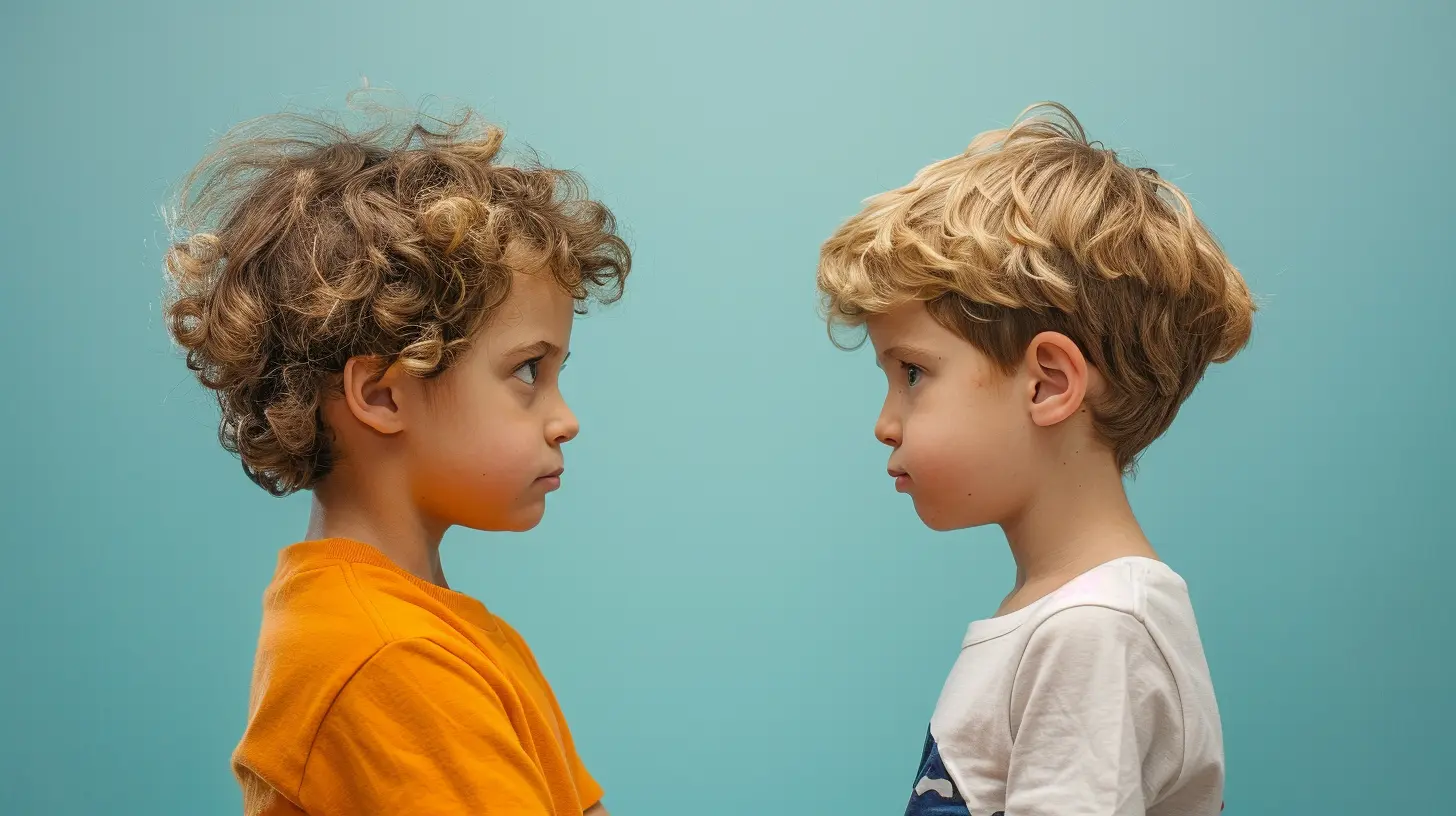Teaching Your Teen to Resolve Conflicts Peacefully
29 September 2025
Let’s be honest—if parenting were a video game, the teen years would be the boss level. They come with mood swings, headphone communication, and the ever-dreaded “I’m fine” that really means anything but fine. Somewhere in the chaos, you realize you’re not just raising a human; you’re raising a future adult—one who needs to know how to handle life’s messes, especially when it comes to conflict.
Conflict resolution isn’t about being a pushover or avoiding confrontation. It’s about teaching your teen to handle disagreements in a way that doesn’t involve slamming doors, eye rolls so hard they cause whiplash, or tossing remote controls across the room like Olympic javelins.
So pull up a chair, hide your snacks (teens always sniff them out), and let’s talk about teaching your teen to resolve conflicts peacefully—with a little humor and a whole lot of real talk.
Why Conflict Happens (a.k.a. Welcome to Teen Drama 101)
Conflict is as normal in life as forgetting your reusable grocery bags. Teens, in particular, are going through a perfect storm of hormonal tsunamis, identity discovery, peer pressure, and the constant background buzz of social media drama. Throw in school stress, friendships, and yes, even dating, and you’ve got the recipe for teenage tension.And guess what? Conflict isn’t the enemy. It’s how they handle it that makes or breaks their relationships (and your sanity).
Step One: Model the Behavior (Yep, That Means You)
Hate to break it to you—kids mimic what they see, not what you say. So if you're solving family disagreements by muttering under your breath like you're in an episode of "Real Housewives," your teen probably thinks that's normal.Want your child to stay calm and communicate during a disagreement?
Then it starts with you.
Try saying things like:
- "I feel upset when you ignore me. Can we talk about this?"
- "I understand you’re frustrated. Let’s figure it out together."
Yes, you might feel like you’re starring in a corny after-school special, but trust me, it works.
Step Two: Teach “Talk First, Text Later”
Teens love texting like fish love water. But texting during a conflict? That’s like trying to defuse a bomb with oven mitts. Misunderstandings blow up fast when emojis and sarcasm get lost in translation.Teach your teen to:
- Talk in person when emotions are high (or at least call).
- Avoid sending angry novels via text.
- Use texting as a tool to make peace, not declare war.
Heck, write an actual peace treaty if it helps. Bonus points for a cute peace-sign emoji.
Step Three: Validate Those Wild Emotions
Remember when your biggest problem was someone eating your leftovers? Your teen's world is way more intense. That math test, that friend group breakup, or that Insta post with no likes? That’s their Everest.So even when their emotional scale seems... over the top, meet them where they are.
Say things like:
- “I see that really upset you.”
- “It’s okay to be mad. Let’s figure out what to do next.”
By acknowledging their feelings, you show them it’s okay to feel—but not okay to lash out like Godzilla attacking Tokyo.
Step Four: The Magic of “I” Statements
Ah, the humble “I statement.” It’s conflict resolution’s secret weapon. Saying “You did this” is a surefire way to kick off World War III. But saying “I feel hurt when…” softens the blow and opens the door to conversation instead of combat.Teach your teen this simple formula:
“I feel [emotion] when [situation]. I would prefer [solution].”
Example: “I feel left out when you don’t include me in plans. I’d prefer if we all talked about group hangouts together.”
Boom. Look at your teen go—basically a baby therapist.
Step Five: Role-Play Without the Eye Rolls
Okay, yes, teens will roll their eyes so hard you’ll wonder if they’re stuck like that. But role-playing conflict situations can actually work—when done right.Make it a game. Get a little silly. Let them play the parent and you be the dramatic teen. Act out common scenarios like:
- A group project gone wrong
- A friend copying homework
- A sibling stealing their hoodie (again)
Then, flip the script. Break down what worked and what didn’t. Throw in popcorn if bribery is needed. No judgment here.
Step Six: Teach Timeouts That Aren’t Just for Toddlers
Believe it or not, walking away from an argument isn’t surrender—it’s strategy. Let your teen know it’s okay to take a break when emotions get too hot to handle.Phrases like:
- “I need a minute to cool off.”
- “Let’s come back to this after we’ve both calmed down.”
It’s like pausing a video game before throwing the controller: smarter, safer, and no dents in the drywall.
Step Seven: Encourage Listening (Like... Actually Listening)
You know that moment when you’re talking and your teen is nodding, but clearly thinking about snacks or TikToks? Yeah, we need to fix that.Teach active listening:
- Make eye contact (not at the phone)
- Don’t interrupt like a Netflix ad
- Reflect back what the other person said (“So you mean…”)
You can even practice it during dinner. Take turns talking about your day without interruptions. Fair warning: this may involve mild begging in the beginning. Stay strong.
Step Eight: Help Them See Other Perspectives
Teen brains are wired for self-focus. It’s not selfishness—it’s science. But empathy is a muscle that needs exercise. Help them flex it by asking:- “How do you think the other person felt?”
- “Would you be okay if someone did that to you?”
Channel your inner Oprah: “Let’s walk in their shoes for a sec.” Even if those shoes are Crocs. No judgment.
Step Nine: Celebrate the Small Wins
Did your teen apologize without muttering under their breath? Did they choose to talk things out instead of launching into a full-scale tantrum? Quick—celebrate like they just mastered algebra!Recognize and praise their efforts:
- “I noticed how calmly you handled that—I'm proud of you.”
- “You really listened to your sister today. That was awesome.”
Positive reinforcement works. Teens may not admit it, but they love knowing they’re doing something right.
What to Do When It All Goes Sideways
Let’s face it—sometimes things blow up despite your best efforts. That’s okay. Conflict resolution is a skill, not a one-time lesson. Be ready to:- Debrief after the fact. “How do you think that went? What could we try next time?”
- Fix what’s fixable, forgive what’s not.
- Remind them (and yourself) that growth takes time—not everyone’s a Zen master overnight.
Even Mr. Miyagi had to train Daniel-san for a while, and there were lots of “wax on, wax off” moments.
Your Teen Isn't Broken (They're Just... Learning)
If it feels like your teen is allergic to peace and deeply committed to drama, take a breath. They’re not broken. They’re learning. Part of becoming an emotionally intelligent adult is figuring out how to rise after every messy, awkward, cringe-worthy fall.And thankfully, you’re there to guide them—possibly with snacks and a deep appreciation for memes.
Keep showing up.
Keep modeling calm communication.
Keep reminding them that peaceful conflict resolution isn’t about never fighting—it’s about fighting fair, talking it through, and walking away without regrets (or broken remotes).
Final Thoughts (a.k.a. You Got This)
Teaching your teen to resolve conflicts peacefully is a wild ride—equal parts patience, modeling, humor, and the occasional locked bathroom retreat. But every awkward conversation, every deep breath, and every “let’s talk this through” moment plants a seed.One day, they’ll use these skills in friendships, relationships, college dorm life, and maybe even when they have families of their own. All because you took the time—eyeball rolls and all—to help them learn.
So pat yourself on the back. You’re raising a peacemaker.
And that, my friend, is parenting gold.
all images in this post were generated using AI tools
Category:
Raising TeensAuthor:

Austin Wilcox
Discussion
rate this article
1 comments
Kaleb Ramirez
Great tips! Teaching teens conflict resolution skills will empower them for life. Love the emphasis on communication and empathy!
October 11, 2025 at 3:35 AM

Austin Wilcox
Thank you! I'm glad you found the tips valuable. Empowering teens with these skills is essential for their future.


